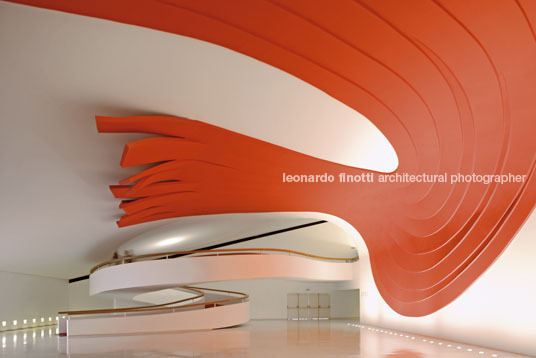auditório ibirapuera são paulo sp, brazil
- description
The auditorium completes the group of buildings in Ibirapuera park, as designed originally by the architect in the 1950s.1 Compared to the original proposal it is lacking only the access square that would separate it from the Oca, which would serve as the main entrance to the park.
The building possesses volumetric simplicity, composed of a single block that in plan has the form of a trapezoid and, in section, the form of a triangle. As well as the other buildings in the park such as the Oca dome, and a great part of the architect’s work, the auditorium is composed of reinforced concrete painted white.The unique form and spatial massing sets it apart from other auditoriums for concerts since the conception of the Paris Opera in the 19th century. It is composed of a separation of three parts, which makes a sequence of foyer, audience, stage from the exterior to the interior.
Interior of the auditorium.
The Labareda, prominent architectural detail on the main entrance of the auditorium.The group formed by the auditorium together with the Oca, which is a semi-sphere, composing two buildings of pure and white geometrical volumes, is considered the most important of the project from an architectural point of view. The articulation of the group would be made complete by a great civic square, marquee, and footbridge, that have not been realized.2
A marquee, executed in red painted metal, covers the main access and gives identity to the building, characterizing it and differentiating it from other buildings. For this reason, the form and color of this element have transformed the branding of the auditorium and act as an architectural logo. It is called officially the Labareda – Portuguese for flame.
On the first floor is a foyer leading to the stage and audience. On the lower floor is a bar, rooms for administration, the music school and dressing rooms. The auditorium has a 18 meter wide back door that, when opened, permits access to what is presented on the stage to people situated outside, for open air concerts. stage.3






































